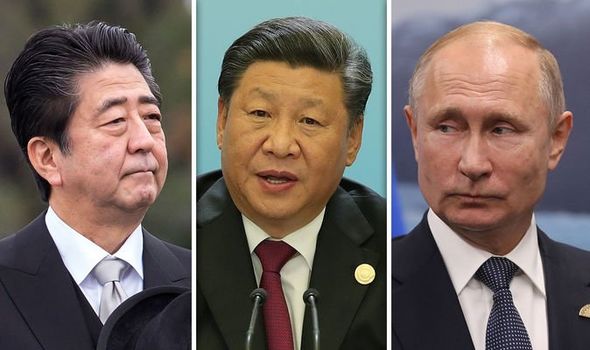South China Sea: Fears of ‘nuclear bombs’ as Beijing sparks frenzied naval confrontations
CHINA has been involved in three messy naval confrontations, two of which happened in the disputed South China Sea.
As Beijing’s tension with Hanoi continues to soar, Philippine President Rodrigo Durterte has had to contend with growing unrest after a Chinese vessel rammed and sunk a Philippine fishing vessel and left behind the 22 crew members, who were eventually rescued by a Vietnamese vessel.
Manila regards the waters the clash took place in as theirs. Claimants in the region have encouraged fisherman to fish in the waters.
Mr Durterte called for US protection: “I’m calling now America. I am invoking the RP-US pact, and I would like America to gather their Seventh Fleet in front of China. I’m asking them now.”
He insisted: “I will join them, I will ride on the boat with the admiral of the US, when the Americans say, ‘We’re here now. Ready?’ I will press the (button).”
The incursion took place within 99 miles of Palawan Island, a popular Philippine tourist destination.
Mr Durtete said: “Palawan may be devastated, occupied or there will be nuclear bombs. We will dry up. So nothing will grow here, we can just wait, just like a big hole coming our way, to suck us to eternity.”
China tested its first nuclear bomb in 1964 and it’s first hydrogen bomb three years later.
Beijing is also the claimant of the largest portion of the hotly disputed South China Sea.
Vietnam has accused China of undermining its sovereignty by sending a vessel to Vanguard Bank, which sits with its 200-mile exclusive economic zone.
Le Thi Thu Hang, a Foreign Ministry spokeswoman in Hanoi, had said on the weekend: “Vietnam has made contact with China and staunchly demanded China to stop all unlawful activities and withdraw its ships from Vietnamese waters.”
In a Friday statement she said: “Over the last several days, the Chinese survey ship, Haiyang Dizhi 8, and its escorts conducted activities in the southern area of the East Sea (Vietnam’s name for the South China Sea) that violated Vietnam’s exclusive economic zone and continental shelf.”
Another confrontation in the Sea of Japan saw both China and Russia infringe territory claimed by both South Korea and Japan with Seoul and Tokyo arguing over who had the right to defend the airspace above the disputed Dokdo/Takeshima Islands.
Russia denies its A-50 surveillance aircraft flying with two Tu-95 bombers and two Chinese H-6K bombers left neutral airspace and infringed upon the disputed airspace.
Seoul says it fired more than 300 warning shots at the Russian bombers.
Both Japan and South Korea have accused one another of “provocation” according to Australian news.com.
Peter Layton of the Griffith Asia Institute told CNN: “This mission will have given (Russia and China) a comprehensive map of the (South Korean) national air defence system.”





